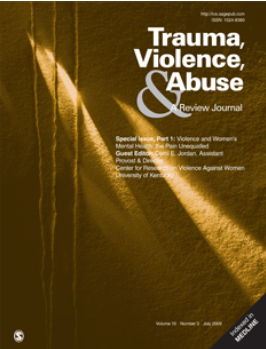Child Maltreatment Increases the Risk for Callous-Unemotional Traits: A Three-Level Meta-Analytic Review.
IF 5.4
1区 社会学
Q1 CRIMINOLOGY & PENOLOGY
引用次数: 0
Abstract
Callous-unemotional (CU) traits are characterized by lack of remorse and guilt, lack of empathy, and shallow and deficient emotions. A growing body of research has examined the association between child maltreatment and CU traits. However, empirical findings on this association are inconclusive. Therefore, this meta-analytic review aimed to examine the overall association between child maltreatment and CU traits and potentially moderating variables. After searching five databases (Web of Science, ScienceDirect, PubMed, MEDLINE, and CNKI), a total of 37 studies (N = 26,010 participants) yielding 165 effect sizes were synthesized in three-level meta-analytic models. Results showed that child maltreatment is significantly and positively related to CU traits (mean r = .183; p < .001). Moderator analyses showed that this association is larger in females than in males, larger in community samples (r = .243) than in clinical samples (r = .073), and in terms of CU trait dimensions stronger for callousness (r = .251) than for uncaring (r = .134) and unemotional dimensions (r = .050). It is concluded that child maltreatment is a risk factor for the development of CU traits and discussed that interventions for CU traits in antisocial groups should be aware of the environmental influence of interpersonal trauma resulting from childhood maltreatment experiences.儿童受虐待会增加出现冷酷无情特征的风险:三层元分析综述》(A Three-Level Meta-Analytic Review.
冷酷无情(CU)特质的特点是缺乏悔恨和负罪感、缺乏同理心、情感浅薄且不健全。越来越多的研究探讨了虐待儿童与 CU 特征之间的关联。然而,关于这种关联的实证研究结果尚无定论。因此,本荟萃分析综述旨在研究儿童虐待与 CU 特质之间的整体关联以及潜在的调节变量。在检索了五个数据库(Web of Science、ScienceDirect、PubMed、MEDLINE 和 CNKI)后,我们在三级元分析模型中综合了总共 37 项研究(N = 26,010 名参与者)产生的 165 个效应大小。结果表明,儿童虐待与 CU 特质呈显著正相关(平均 r = .183; p < .001)。调节分析表明,这种关联在女性中大于男性,在社区样本中(r = .243)大于在临床样本中(r = .073),就 CU 特质维度而言,冷酷无情(r = .251)强于无情无义(r = .134)和无情无义(r = .050)。结论是儿童虐待是形成 CU 特质的一个危险因素,并讨论了针对反社会群体的 CU 特质的干预措施应注意儿童虐待经历所造成的人际创伤的环境影响。
本文章由计算机程序翻译,如有差异,请以英文原文为准。
求助全文
约1分钟内获得全文
求助全文
来源期刊

Trauma Violence & Abuse
Multiple-
CiteScore
13.60
自引率
7.80%
发文量
131
期刊介绍:
Trauma, Violence, & Abuse is devoted to organizing, synthesizing, and expanding knowledge on all force of trauma, abuse, and violence. This peer-reviewed journal is practitioner oriented and will publish only reviews of research, conceptual or theoretical articles, and law review articles. Trauma, Violence, & Abuse is dedicated to professionals and advanced students in clinical training who work with any form of trauma, abuse, and violence. It is intended to compile knowledge that clearly affects practice, policy, and research.
 求助内容:
求助内容: 应助结果提醒方式:
应助结果提醒方式:


